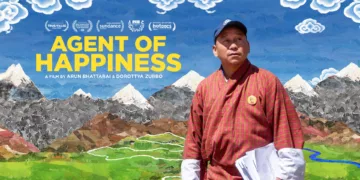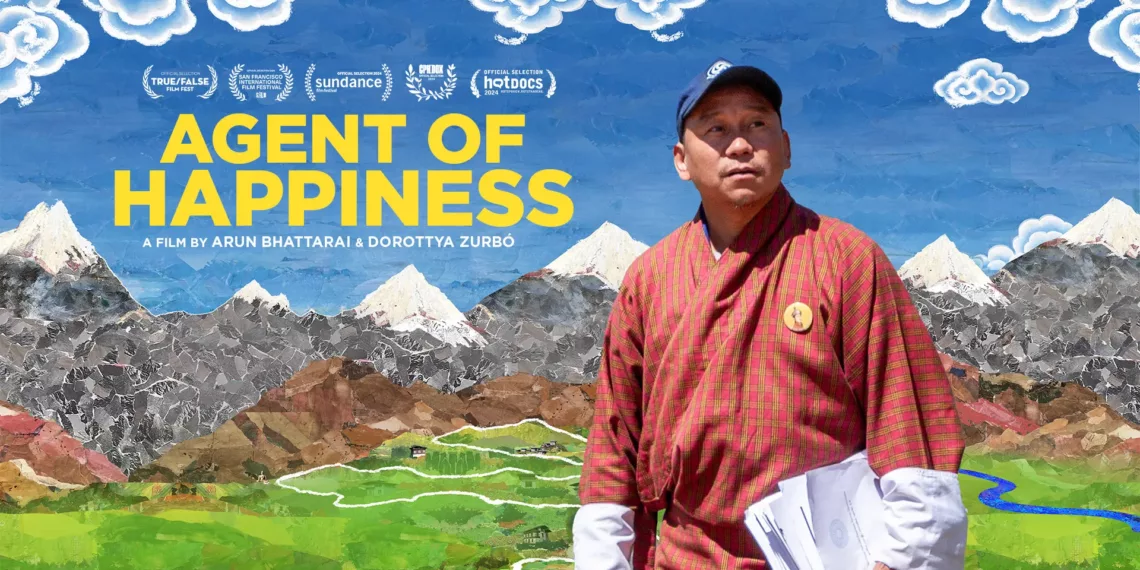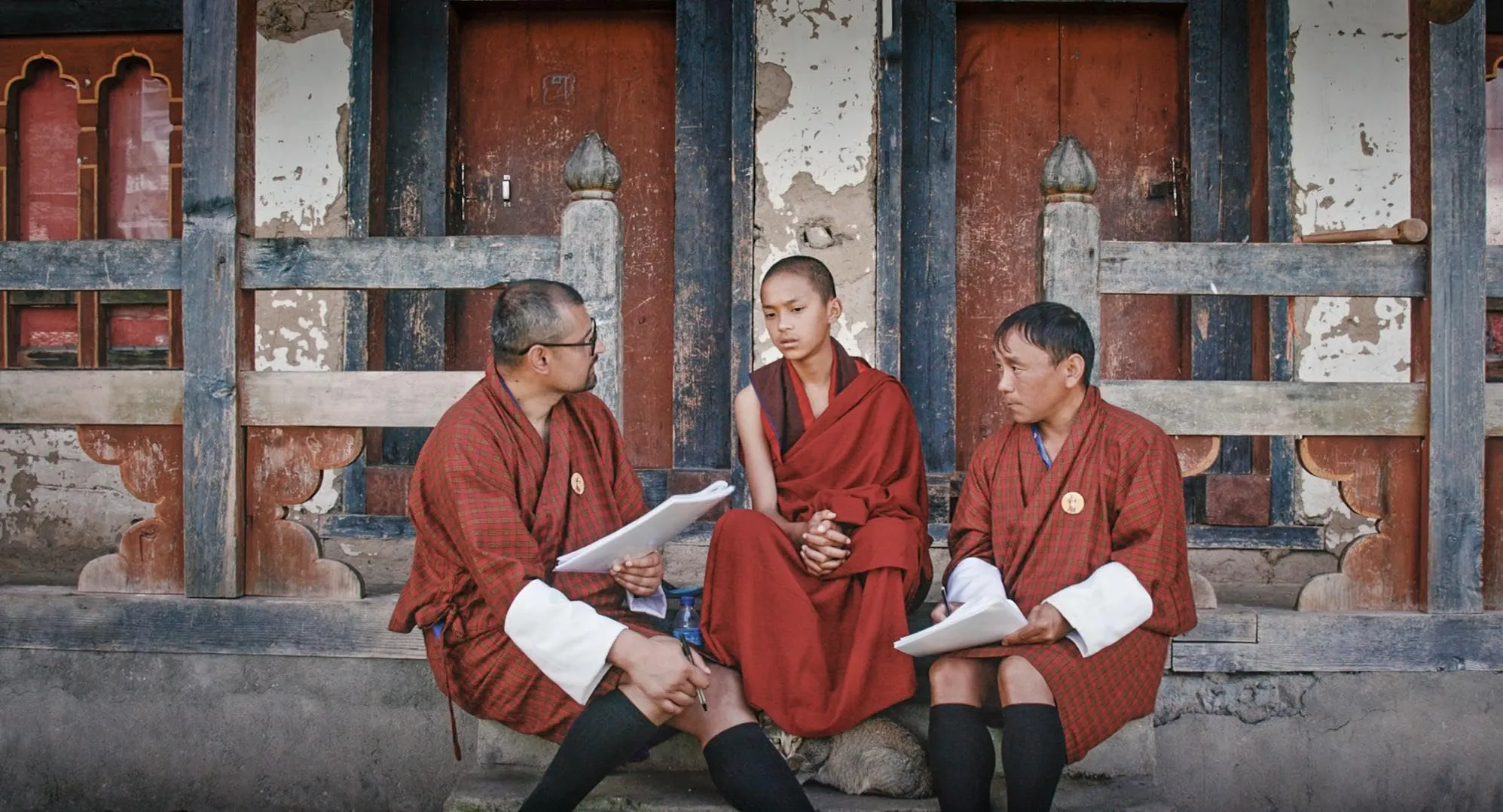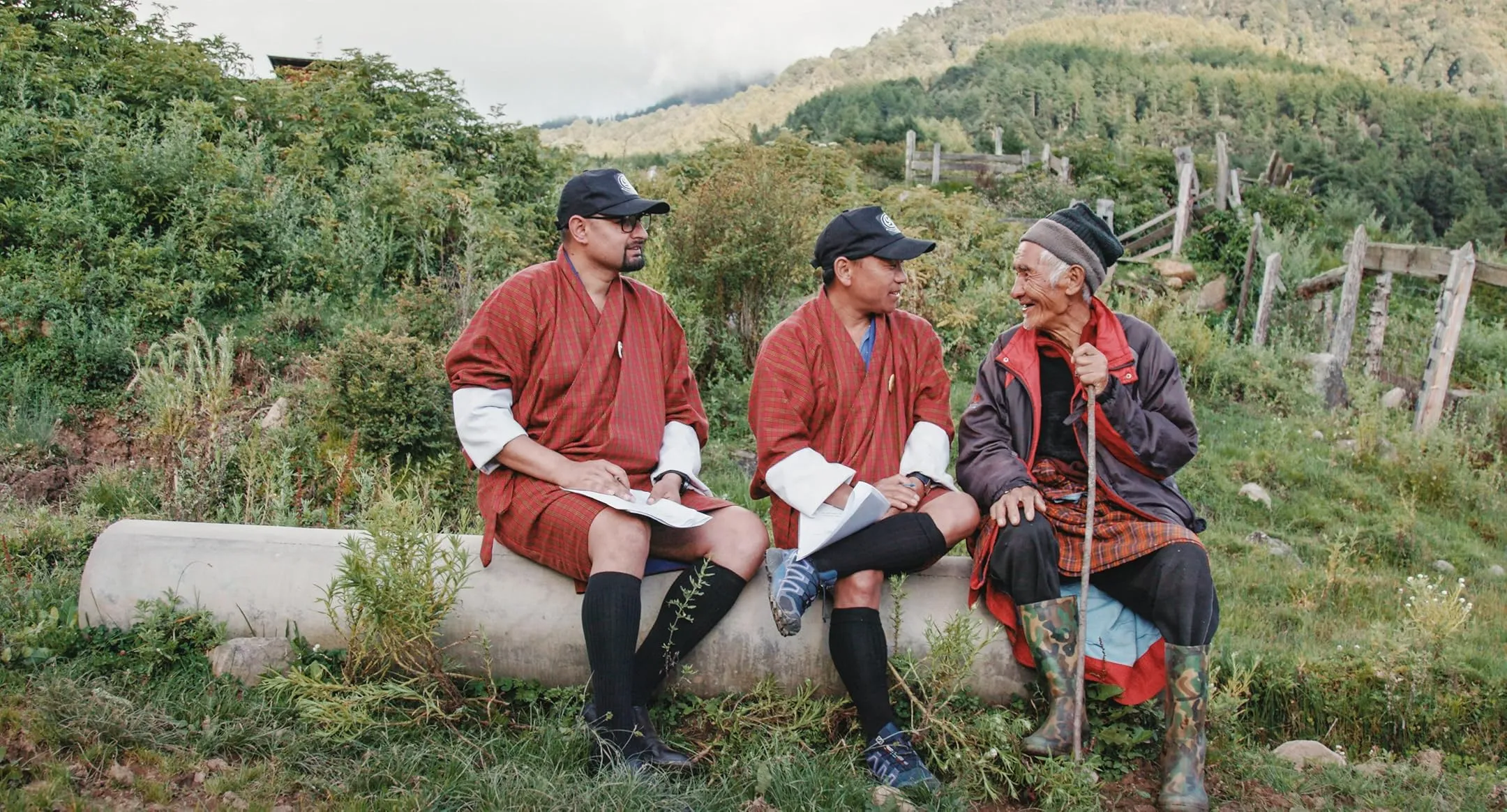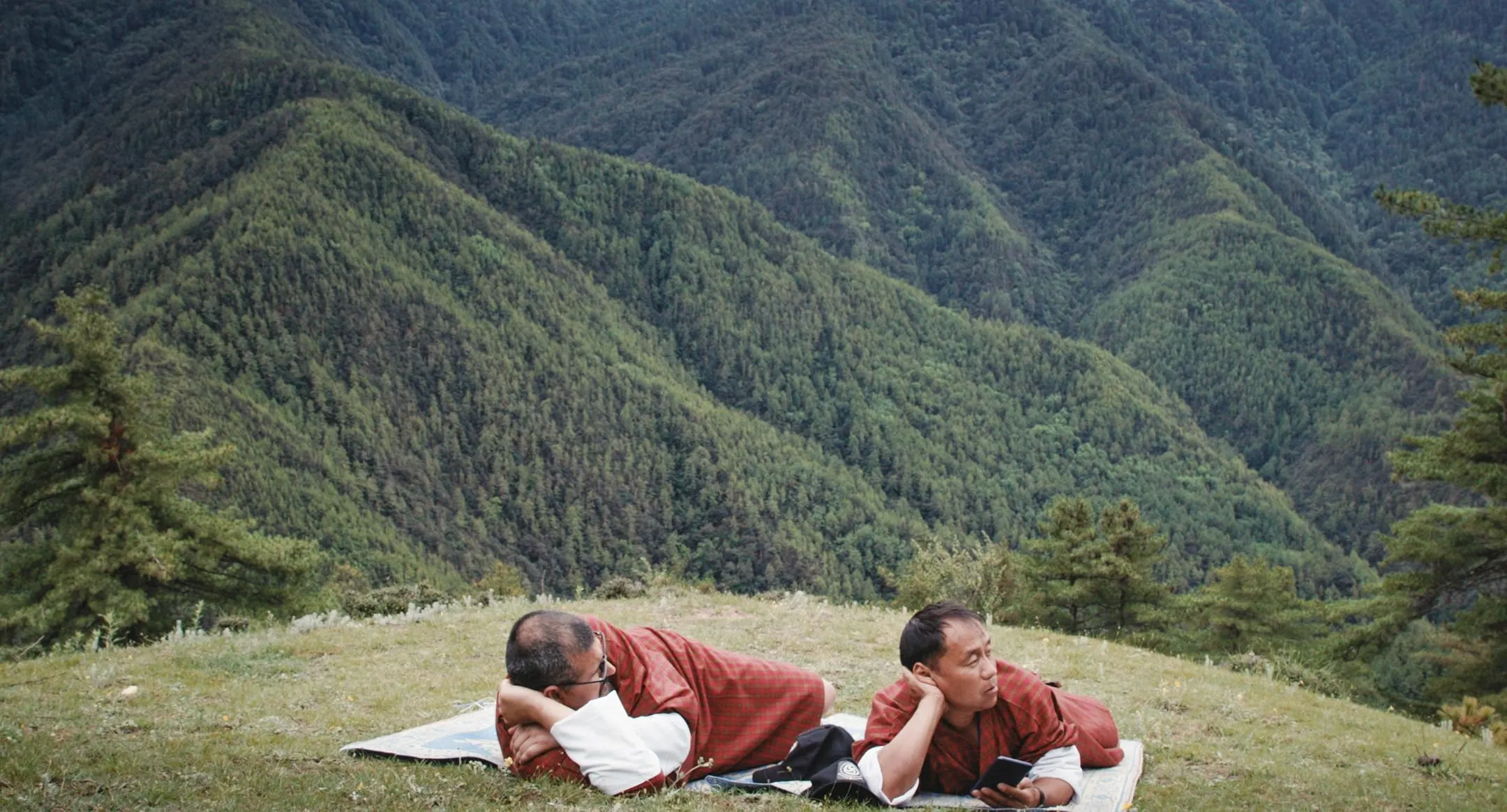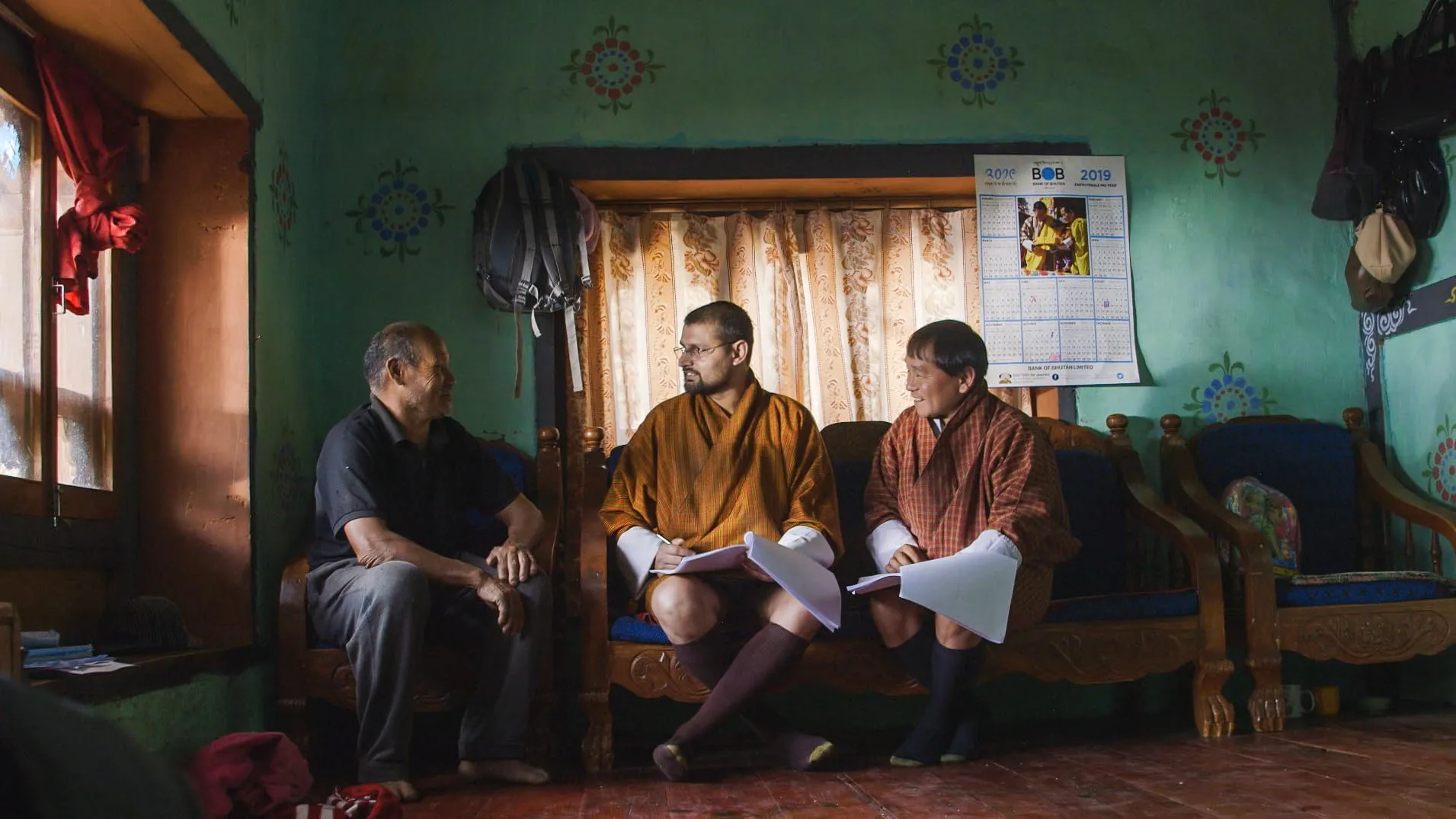Arun Bhattarai and Dorottya Zurbó’s documentary Agent of Happiness takes viewers deep into the lush valleys and soaring peaks of Bhutan, home to an unusual pursuit. Instead of solely chasing economic growth, this tiny Himalayan kingdom measures national well-being through its Gross National Happiness index. We meet 40-year-old Amber Kumar Gurung, one of over 100 government agents tasked with crunching the numbers.
Door to door, Amber and his colleague record Bhutanese citizens’ answers to 148 questions aiming to quantify happiness. Subjects reply to unusual prompts about goats, television ownership, and the intangibles of trust, work-life balance, and karma.
Through Amber’s work and private struggles, the film explores both the challenges and complexities of assigning a statistic to human contentment. His interviews cover rich and poor, rural and urban, capturing a diversity of experiences that don’t always fit neatly into surveys. We also learn Amber’s own happiness is hindered by statelessness, despite his dedicated service calculating others’ joy.
As Bhattarai and Zurbó observe these quiet lives, nuanced portraits emerge that raise thought-provoking issues around defining and measuring happiness on personal and national scales. Agent of Happiness takes viewers on a gentle journey through one small kingdom’s extraordinary attempt to reshape how progress is viewed and felt by its people.
Measuring Happiness Across Bhutan
Amber Gurung and his colleague Gunaraj have an unusual task: traveling the country to gather data on how happy the Bhutanese people are. We join them on their journeys from small rural villages tucked away in valleys to somewhat larger towns nestled at higher elevations. Their days are spent visiting homes, sitting down with residents, and posing a lengthy list of queries.
The survey covers 148 questions in total, an eclectic mix of objective and subjective prompts. Farmers are asked about assets like cows and tractors that fit their lifestyle. But residents in the growing urban centers face questions less applicable to their lives. Amber also inquires about less tangible factors, such as relationships, sleep quality, and feelings toward the government—attempting to quantify more intangible aspects of happiness.
During interviews, different approaches to evaluating contentment emerge. A rice farmer explains he’s as joyful as the number of grains he has stored. Others see possessions like TVs as irrelevant. The agents even get an amusing response—”none” ” to every question about animals and appliances. Yet people understand the importance of the study and generally participate willingly.
As conversations wrap up, we see on-screen the villager’s calculated happiness rating. An ecstatic farmer receives a high score for simply treasuring rural tranquility. But not all match the cheery national image. A grieving widower, though materially stable, mourns his late wife’s absence. Are surveys truly gauging these citizens’s subjective well-being or just their conformity to perceived societal ideals?
Following Amber and Gunaraj’s circuit gives fascinating insight into this unusual census. But their surveys, while illuminating rural life, may overlook urban diversity in 21st century Bhutan as definitions of fulfillment evolve in complex, less easily quantified ways.
Cast of Character: Individuals Beyond the Index
Our introduction to Amber Gurung goes deeper than just his role crunching data. As an agent of happiness, his personal score is a middling five. But through his work interviewing others, we pick up that he truly wants to start a family—if only the law recognized his disputed citizenship.
Then there’s Dechen, a nightclub performer whose identity the rigid survey fails to capture. While supporting her cancer-stricken mother, she discusses fears the questions can’t quantify. Beyond livestock are the intangibles that shape well-being, like feeling at home in one’s own skin.
We also meet Yangkha, responsible for her young sibling due to their mother’s alcoholism. Trailing behind her seems like an entire life the survey overlooks—burdens that weigh on a teenager needing freedom to grow.
Brief glimpses at other lives further spotlight humanity beyond statistics. A farmer devotedly memorializes his deceased wife, still saddened despite material goods. And three co-wives, while legally wed, find solace and laughter in their own sisterhood apart from the husbandrating them perfectly content.
Through these dynamic characters, the film expands beyond procedure. We see how individual circumstances require definitions of fulfillment too intricate for checkbox questionnaires. Amid his duties, Amber comes to represent those marginalized falling through the gaps of policy supposedly helping all Bhutanese thrive.
By exploring specific stories usually reduced to numbers, the documentary pierces surfaces, suggesting life’s complexity exceeds any index’s grasp. Happiness proves deeply personal, as do the struggles society may miss in its pursuit of metrics.
Beyond Numbers: The Many Facets of Happiness
While gauging goats and cattle seems fitting for farmers, this approach doesn’t quite cover life in modern Bhutan’s towns. Questions about possessions tell just part of the story too, ignoring how identity or struggles affect well-being.
The survey often treats contentment as a statistic based on assets alone. But for Dechen and others, inner peace involves more than wealth or status. Younger generations and urbanites likewise view fulfillment through different lenses as traditions evolve with technology.
This disconnect hints that definitions vary hugely between individuals and over time. What creates joy in one stage of life may not in another. No metric could ever fully summarize something as personal as happiness.
The film subtly proposes Bhutan’s natural splendor boosts reported national satisfaction. Yet for some, like stateless Amber, even paradise brings mixed feelings. While most Bhutanese flourish with their unique identity, minorities remain on the sidelines of the story told by metrics.
By following lives that don’t conveniently conform, the documentary depicts happiness as intricate and questions how numbers alone could address fractures beneath prosperity’s surface. It highlights what qualitative data may hide, from ethnic issues to struggles the scale can’t compute.
Overall, the film presents no conclusions, simply observing this novel pursuit with empathy. In the process, it sparks thought about the imprecision of reducing feelings to figures and how well-being involves so much more than what questionnaires contain. Some riddles, it seems, even science cannot easily solve—and that’s what makes us beautifully, messily human.
Beyond the Score: Amber’s Uncounted Strife
As the agents go from village to village recording responses, we learn Amber longs for more than bachelorhood. Desiring his own family, he worries time is running out—if only the law saw him as truly Bhutanese.
Yet his citizenship was revoked after his father passed, as tensions rose between native groups. Born stateless, this status shaped all that follows. On paper, he helps craft the index but remains undefined by it.
His dating adventures showcase these ripple effects. Meeting Sarita gives hope, but her dreams of traveling abroad expose his inability to partake. Without papers proving his place, app matches lead nowhere, as do his odds of partnership.
In Amber’s pursuit of love despite the odds, we glimpse critiques of the survey’s limits. While numbers analyze reported satisfaction, they overlook divisions, ending some from fulfillment. His marginalization personifies what statistics mean to obscure: those falling through cracks of “progress” aimed to lift all.
As the film peers beyond metrics to spotlight lives freely, Amber emerges as a symbol. Through his eyes, we view social realities reducing lives to data and difficulties individual indexes fail to address in pursuit of national visions. His journey gives a human face to those whose struggles illusions of completeness may hide.
Capturing complexity through simplicity
This film lets its characters’ lives unfold with minimal interference. Watching Amber go about his work collecting surveys, we become unseen observers of conversations that reveal so much beyond numbers.
And what vistas we observe! Bhattarai’s camera embraces Bhutan’s stunning scenery like an art gallery. Against such backdrops, people appear simultaneously small yet vibrant.
Occasional title cards showing survey scores offer dry humor contrasting joyous interviews. Voiceovers grant insight into souls surveys struggle to contain. A lilting score draws emotion from cool facts.
Layer by layer, detail by tiny detail, Agent of Happiness constructs multidimensional portraits from a foundation of simplicity. It acknowledges happiness’ intricacy within a seemingly clinical assignment. Without judges or experts, the film imparts its own wisdom by seeing beyond what it literally sees.
Through patient observation untainted by outside views, a profound understanding emerges of what statistics may miss. In letting real lives anonymously immerse us so fully, it engages both minds and hearts.
More Than Statistics Can Say
This film offers more than a glimpse into Bhutan’s pursuit of quantifying contentment. By focusing on individuals whose experiences defy simplification, it probes the complex interplay between policy and people.
Amber, Dechen, and others reveal lives statistics struggle encapsulating, from ethnic issues to personal struggles unseen in surveys. Their humanity highlights happiness’ intricacy versus reduction to metrics.
While introducing us to this unique country’s approach, the documentary avoids easy praise or critique. With minimal intrusion, it allows portaits of ordinary lives to emerge naturally complex.
In showing how statistical victories may obscure divisions, the film sparks thought. When is quantification insightful, and when does it risk overlooking hardship? At its best, might data complement but not replace discussion?
Ultimately, Agent of Happiness takes us beyond numbers to a place statistics cannot—uunderstanding each person’s fulfillment remains deeply personal, as are the challenges societies must continuously work to surmount. It is in opening dialogues, not closing them, that we reach fuller pictures of what it means to live well.
The Review
Agent Of Happiness
Agent of Happiness presents a nuanced, thoughtful examination of Bhutan's pursuit of quantifying well-being. Through following the lives of ordinary people, it illuminates both the insights and limitations of statistical analysis, sparking reflection on measuring concepts as profoundly personal as happiness. Directed with minimal intrusion, the film allows complexity and contradiction to emerge organically from its characters, mirroring life's rich intricacies that no single metric can fully capture.
PROS
- Interesting examination of Bhutan's unique pursuit of GNH
- Observational style immerses viewers in people's lives.
- Characters feel authentically portrayed in all their complexity.
- Sparks thought around quantifying concepts like happiness.
- Subtle yet impactful social commentary on limitations of metrics
CONS
- May feel slow-paced for some viewers.
- A statistics-focused approach risks feeling dry at times.
- Minimal commentary leaves more open to interpretation.
